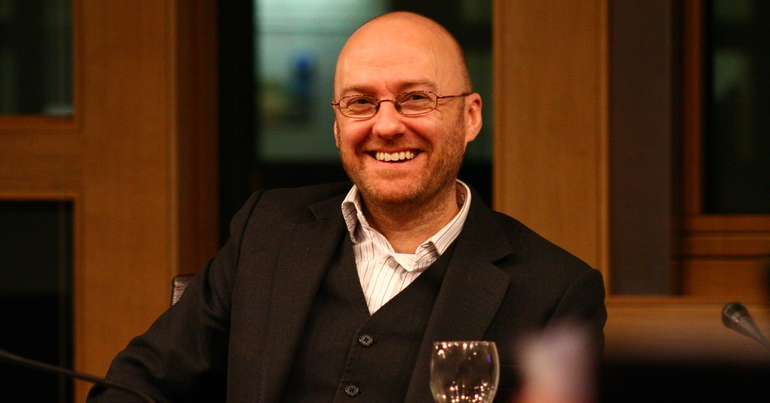Bright Green Q&A with Scottish Green Party co-leader candidates: Patrick Harvie

The Scottish Green Party is currently electing two co-leaders for the first time in its history. We’re speaking to each of the candidates and finding out why they’re standing and what there vision is for Scotland. First up is Patrick Harvie.
What is your vision for the Scottish Green Party and how would you enact it as co-leader of the Scottish Greens?
The new constitution which we adopted this year, and which creates the positions of Co-Leader for the first time, also restates our core purpose as a party: “to work toward a non-violent, democratic, just, and sustainable society free from the predations and inequities of capitalism”. The precise wording may be new, but the party’s basic vision is what it has always been. We are the only political party in Scotland with any electoral track record which challenges the basic nature of the current economic system, and we do so because it is destructive, exploitative, unjust and unsustainable.
Our task is to convince Scotland that the transformed society we need is one which will also be fairer, healthier and better to live in, and more than anything that it is possible. We need to convince Scotland that putting Greens into government is the way to make it possible.
Looking at the state of today’s world, hope can be hard work these days. If Greens, and the green vision for society, feels unrealistic to people then we will not succeed. So we also need to be in no doubt that it’s the status quo which is unrealistic.
What would your main priorities be as co-leader?
Though we are creating the positions of Co-Leader for the first time, we’re not doing what most other parties do by investing all power and authority in individual leaders. We’ll remain a party which is democratic and where leadership is a shared task.
But I think there is a very strong consensus across the party, including the Co-Leader candidates, that re-energising our local activism and sharing skills and experience between our branches are among the highest priorities for internal work. We’ve just come through a long re-structuring process, and while that was absolutely necessary it did take a lot of people’s time and energy. It should allow us to organise more effectively, but that organisation must now be focused on building the culture of campaigning that we need for the next election cycle.
As we get ready for the 2021 election, there’s also a strong view in the party that we need to go beyond our constitutional minimum of 50:50 gender balance in candidate selection. The unpredictability of the AMS voting system meant that 50:50 wasn’t enough to prevent a very male-dominated parliamentary group being elected last time, and I think the whole party is determined to do better.
What are the biggest issues facing Scotland right now?
Where to begin? We still have chronic inequality which stems from deindustrialisation, and which has been made worse by austerity. We’re over exposed to the fossil fuel industry, which is both lethal and doomed. We have low productivity and a lack of public investment, both in services and in green infrastructure. We face many of the same global challenges as the rest of the world, from the climate crisis and biodiversity loss to demographic pressures and health inequalities.
The Green New Deal is an attempt to address these issues and more in a holistic way, building a fairer, more equal and more productive economy by building the sustainable society we need collectively, instead of pretending that these problems can be left to the free market which caused them in the first place.
Scotland must also continue its struggle for the right to make its own choices. The UK Government’s assault against the devolution settlement has proved that what we gained 20 years ago simply isn’t enough to meet the challenges of the future.
Britain faces a constitutional crisis – from Brexit to border questions in the north of Ireland and from the crumbling first past the post parliamentary to the trampling of devolved institutions. How should the Scottish Greens respond to this?
Britain isn’t just facing a constitutional crisis, it’s diving headlong into it. With a Tory party membership which would be willing to see the end of the Union, economic wreckage and even the destruction of their own party to deliver their hard right Brexit project, and a Labour leadership apparently unwilling or unable to challenge them, it’s hard to find sufficient hyperbole to describe the situation.
The Green position is clear that the people of Scotland have the right to choose their own future, having been denied what they voted for. But 2014 and 2016 were more than just simple binary decisions – they both concerned deeper divisions about the kind of society we want to be. The current crisis also needs more than simplistic answers, and the imminent Citizens Assembly offers the chance of a more open, deliberative way of exploring our country’s future. If it’s a success, it could open up a more creative space for new ideas, and Greens should be optimistic about that kind of political innovation.
Climate change has never been higher up the political agenda. How should the Scottish Greens harness this and what concrete proposals should the Scottish Greens be putting forward to tackle the climate crisis?
It’s not just that climate change itself is high up the agenda. I believe that what’s happening is a recognition of what Greens have been saying for many years – that a response to this existential challenge can’t be limited to technology change, or top-down policy, or individual lifestyle changes. They all have their part to play, but if they happen in the context of our current economic system, they will never be enough.
More and more people are recognising that we need transformational change in our society, our economy and our politics. I’m currently working with the New Economics Foundation, who pioneered the idea of the Green New Deal a decade ago, and I’m convinced that even within the constraints of devolution, this concept can be applied in Scotland.
We’re not short of practical tasks to get started on, from public investment in renewable heat, to the social housebuilding we need to meet both social and environmental challenges. We need a government with the courage to say that public-led investment should be the critical driver.
Assuming the Scottish Greens continue to hold the balance of power in the Scottish Parliament, what would your priorities be in budget negotiations with the SNP? What concessions would you demand for the Scottish Government to secure Green support?
Our MSPs don’t just work on their own initiative. Each year we open up debate within the party membership about the priorities ahead, including the budget. It’s our whole party, at our annual conference, which decides what “red lines” to set. Part of last year’s agreement included commitments – for new local tax powers and a three-year funding settlement for councils, for progress toward abolishing Council Tax and for a continual shift away from high-carbon capital spending – commitments which are all due to be progressed before the next budget process begins.
This year, there is a strong case for insisting that the rhetoric about the “climate emergency” turns into action in the budget. We are yet to see any serious new commitments from the Scottish Government about the emergency action that’s needed, so the budget debate within the party is beginning with the proposal that this should be the priority.
Going into the Scottish Parliamentary elections in 2021, how would you lead the Scottish Greens to electoral success?
The party has changed hugely over the last few years, since the extraordinary membership surge in 2014. We have many more branches across the country, and where we’ve developed an active local campaigning culture it has gained stronger Green support, and new MSPs and councillors. But this hasn’t happened everywhere. We still have a lot of work to do if we’re to build that campaigning culture across the whole country.
This is a priority that I think every candidate for Co-Leader has talked about, but it will involve far more than just the actions of two Co-Leaders. Through 2021 and the local elections in 2022 we need to share the skills and experience we’ve been building, across all our branches. We need to support our local activists better, and help new candidates to build their profile and their confidence.
But unlike this year’s European election, which was a difficult one for us, 2021 will be a judgement on the SNP’s record in Government. We have delivered on our commitment to challenge them, but to do so constructively wherever possible. Scotland has a fairer tax system, better funded local services and stronger environmental protection as a result of our work. But from climate policy to social security, from animal welfare to housing, there’s a long list of issues where the SNP have disappointed even their own members. We will have a powerful story to tell about the positive impact Greens make when they get elected and the need for more Green influence, and a positive offer to make to voters who want Scotland to be a fairer, greener and healthier society.
Read what the other candidates for the Scottish Greens co-leader election had to say here.




Leave a Reply